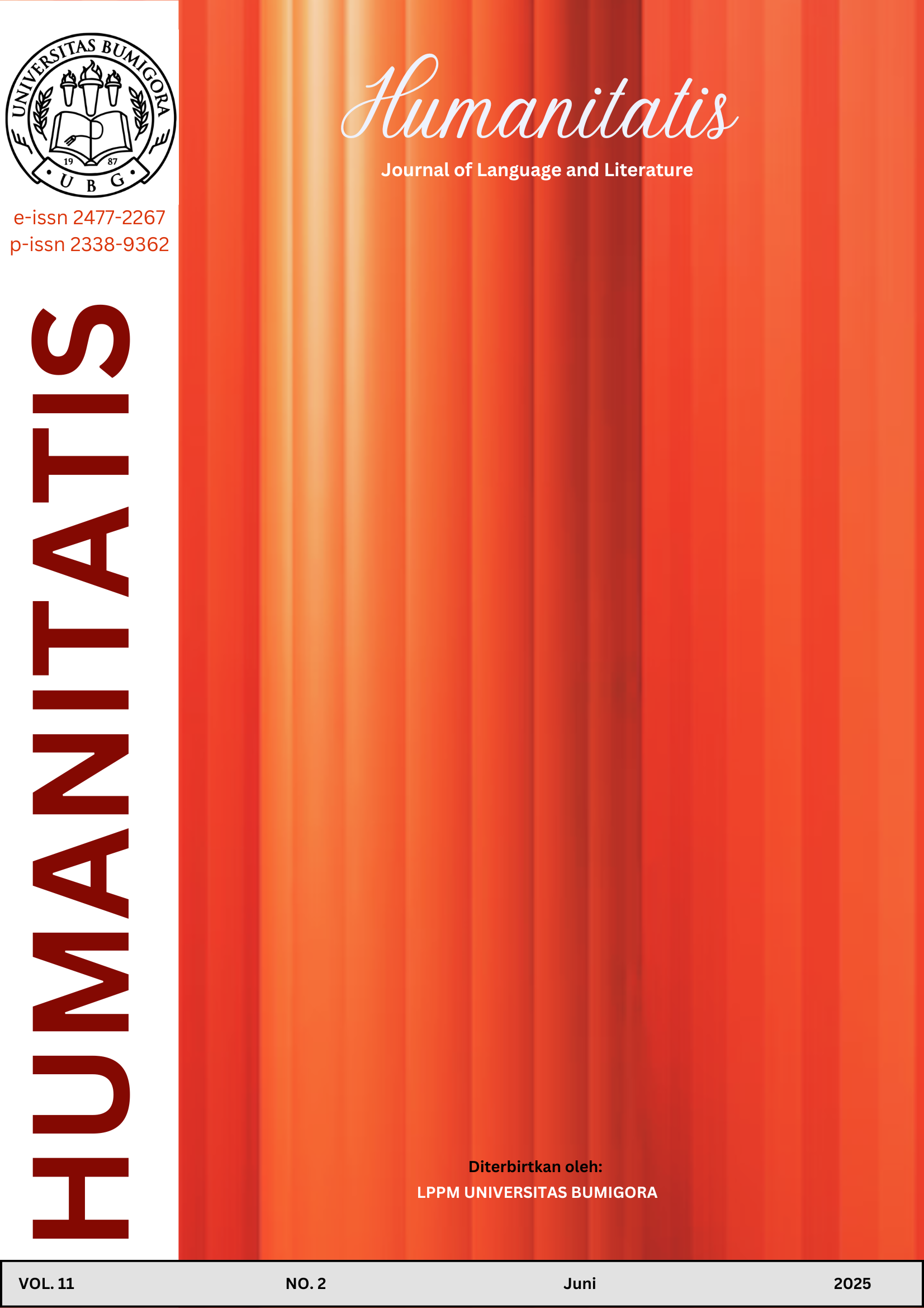Integrating Digital Media in Content-Based Language Teaching for English Specific Purposes: A Study of Online Learning Platforms in Reading Comprehension
DOI:
https://doi.org/10.30812/humanitatis.v11i2.5066Keywords:
Content-Based Language Teaching, ESP, Digital Media, Reading Comprehension, Classroom Action ResearchAbstract
This study investigates the integration of digital media in Content-based Language Teaching (CBLT) to improve reading comprehension in contexts involving English for Specific Purposes (ESP). Using a Classroom Action Research (CAR) design, the study was conducted over two cycles involving 79 undergraduate students from the Management Study Program at Universitas Bumigora. Digital media—including a Moodle-based Learning Management System (LMS), WhatsApp group discussions, and AI-generated video content–were implemented to support student engagement and content understanding. Quantitative data from pre- and post-tests revealed a significant improvement, with a mean score increase of 34.35 points (p < .001). Qualitative data from classroom observations indicated enhanced learner autonomy, increased peer collaboration, and better task engagement, particularly in the second cycle. The findings suggest that integrating digital platforms into ESP instruction improves comprehension and fosters student-centered learning environments. This study supports previous research on the pedagogical potential of digital media in language education and provides a practical model for embedding technology in higher education language classrooms.
References
Abedi, E. A. (2024). Tensions between technology integration practices of teachers and ICT in education policy expectations: Implications for change in teacher knowledge, beliefs and teaching practices. Journal of Computers in Education, 11(4), 1215-1234. https://doi.org/10.1007/s40692-023-00296-6
Alenezi, M. (2023). Digital learning and digital institution in higher education. Education Sciences, 13(1), 88. https://doi.org/10.3390/educsci13010088
Belda-Medina, J. (2021). Enhancing multimodal interaction and communicative competence through task-based language teaching (TBLT) in synchronous computer-mediated communication (SCMC). Education Sciences, 11(11), 723. https://doi.org/10.3390/educsci11110723
Bui, T., & Macalister, J. (2021). Online extensive reading in an EFL context: Investigating reading fluency and perceptions. Reading in a Foreign Language, 33(1), 1-29.
Bygstad, B., Øvrelid, E., Ludvigsen, S., & Dæhlen, M. (2022). From dual digitalization to digital learning space: Exploring the digital transformation of higher education. Computers & Education, 182, 104463. https://doi.org/10.1016/j.compedu.2022.104463
Caputolan, S. M., Gonzaga, H. G. D., Perez, N. R., & Vasquez, J. J. (2025). Exploring teachers' perceptions on effective teaching strategies for English language learners. International Journal of Recent Advances in Multidisciplinary Topics, 6(3), 32-43.
Fleta, M. T. (2023). Language and content learning through oracy at pre-primary education and in CLIL-based contexts. In Handbook of CLIL in pre-primary education (pp. 297-314). Springer. https://doi.org/10.1007/978-3-031-04768-8_18
Ginting, D., Sabudu, D., Barella, Y., Madkur, A., Woods, R., & Sari, M. K. (2024). Student-centered learning in the digital age: In-class adaptive instruction and best practices. International Journal of Evaluation and Research in Education (IJERE), 13(3), 2006-2019. https://doi.org/10.11591/ijere.v13i3.27497
Goyal, S., Khaliq, F., & Vaney, N. (2023). Implementation of the online learning management system 'Moodle' as a blended approach to online teaching. Indian Journal of Physiology and Pharmacology, 67(1), 64-72. https://doi.org/10.25259/IJPP_208_2022
Haleem, A., Javaid, M., Qadri, M. A., & Suman, R. (2022). Understanding the role of digital technologies in education: A review. Sustainable Operations and Computers, 3, 275-285. https://doi.org/10.1016/j.susoc.2022.05.004
Hossain, K. I. (2024). Literature-based language learning: Challenges, and opportunities for English learners. Ampersand, 13, 100201. https://doi.org/10.1016/j.amper.2024.100201
Masitoh, F., Fitriyah, I., & Mumtaza, I. K. (2024). EFL teachers' perceived efficacy of digital platforms in varied online English classes in a higher education. Journal of Languages and Language Teaching, 12(1), 463-474. https://doi.org/10.33394/jollt.v12i1.9298
Mason, E. S. (2024). Improving student writing fluency and writing self-efficacy through blogging [Doctoral dissertation, University of Dayton].
Ninghardjanti, P., & Dirgatama, C. H. A. (2021). Building critical thinking skills through a new design mobile-based interactive learning media knowledge framework. International Journal of Interactive Mobile Technologies (iJIM), 15(17), 49-68. https://doi.org/10.3991/ijim.v15i17.23801
Nyathi, V. S., & Sisimayi, T. P. (2024). Adaptive learning technologies for higher education: Exploring the use of interactive online learning platforms for higher education. In Adaptive learning technologies for higher education (pp. 91-124). IGI Global.
Ojugo, A. A., Odiakaose, C. C., Emordi, F. U., Ejeh, P. O., Adigwe, W., Anazia, K. E., & Nwozor, B. (2023). Forging a learner-centric blended-learning framework via an adaptive content-based architecture. Science in Information Technology Letters, 4(1), 40-53. https://doi.org/10.31763/sitech.v4i1.1186
Purwanto, A., Rasyid, Y., Anwar, M., & Mayuni, I. (2022). Moodle-based flipped learning-model to increase basic translation skills and 21st century skills. Scope: Journal of English Language Teaching, 7(1), 01-10. https://doi.org/10.30998/scope.v7i1.13891
Saeedi, Z., & Najjarpour, M. (2025). Enhancing technical vocabulary acquisition in ESP context through virtual content development with Articulate Storyline. Social Sciences & Humanities Open, 11, 101539. https://doi.org/10.1016/j.ssaho.2025.101539
Sivri, H., & Sahin, S. (2021). Adopting learner-centered education and perceptions of school effectiveness. Osmangazi Journal of Educational Research, 8(1), 48-76.
Suhendra, E. (2023). Enacting content-based language teaching in ESP classroom for reading comprehension. EDULANGUE, 6(1), 62-72. https://doi.org/10.20414/edulangue.v6i1.7289
Teyebi, S., & Yaiche, W. (2024). Assessing the efficacy of Moodle: Perspectives from educators and learners at the Department of English, Ahmed Salhi University Centre, Naama. ATRAS Journal, 5(2), 109-128. https://doi.org/10.70091/Atras/vol05no2.9
Tracy, S. J. (2020). Qualitative research methods: Collecting evidence, crafting analysis, communicating impact (2nd ed.). Wiley Blackwell.
Zarei Darabi, N. (2025). The effect of meaning-focused instruction on developing reading comprehension and vocabulary knowledge of EFL learners in the light of self and peer assessment [Doctoral thesis, Universidad Complutense de Madrid].
Downloads
Published
Issue
Section
License
Copyright (c) 2025 Erwin Suhendra, Lela Rahmawati, Hilda Hastuti, Wahyu Kamil Syarifaturrahman

This work is licensed under a Creative Commons Attribution 4.0 International License.
















